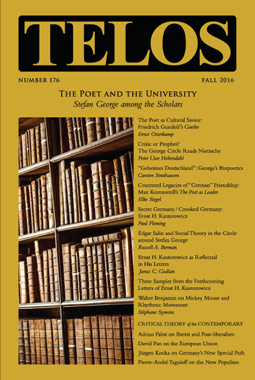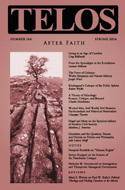 One often speaks of the importance of poetry for thought, even of poetry as a mode of thinking, and perhaps nowhere more than in Germany, the country of Dichter and Denker, of poets and thinkers. The German intellectual tradition is defined by a long, intimately interwoven relation between poetry and thought going back to the solidification of the Modern Age in the eighteenth century: Klopstock’s “Republic of Letters”; Goethe and Schiller’s Classicism, especially Schiller’s “aesthetic state”; Hölderlin’s “founding poets” and the centrality of poets in “the time of need”; Jena Romanticism’s inextricable relation between “Symphilosophie” and “Sympoesie”; Hegel’s definition of beauty as “the sensible shining forth of the idea”; and onward to this day.
One often speaks of the importance of poetry for thought, even of poetry as a mode of thinking, and perhaps nowhere more than in Germany, the country of Dichter and Denker, of poets and thinkers. The German intellectual tradition is defined by a long, intimately interwoven relation between poetry and thought going back to the solidification of the Modern Age in the eighteenth century: Klopstock’s “Republic of Letters”; Goethe and Schiller’s Classicism, especially Schiller’s “aesthetic state”; Hölderlin’s “founding poets” and the centrality of poets in “the time of need”; Jena Romanticism’s inextricable relation between “Symphilosophie” and “Sympoesie”; Hegel’s definition of beauty as “the sensible shining forth of the idea”; and onward to this day.
|
Politicians who warn us against the New Right have been speaking about “Weimar conditions.” Isn’t the comparison with the pre-Hitler era exaggerated? Not as far as the surprise attack dynamic is concerned. One is in fact reminded of the speed with which the National Socialist party gained political ground in the Weimar Republic. First it had 18%, then suddenly 30%, and soon governing without it became practically impossible. Let’s be honest: Today no one knows where the AfD will reach its limit. In Austria, the candidate of the right-wing populist FPÖ got half the votes. Not that long ago, who would have thought this possible? As far as the willingness to accept refugees is concerned, Germany is the lonely leader in Europe. No other European country is behaving similarly, nor does the United States. Evidently there is a new special path for Germany. How can this be explained? First of all: Germany is prosperous; we’re doing quite well. If we had southern European unemployment rates or the scarcity of East European countries, we would be less hospitable. Furthermore, influential industrial associations early on argued for the generous reception of refugees and continued to oppose the reestablishment of national border controls, on the basis of economic interests. Human rights activists and capitalists are promoting the same policy, and not for the first time. The left-wing critique of capitalism generally overlooked this affinity, but right-wing capitalism critics understand this very well: for them capitalism is not sufficiently national—it is too universalist. Nicholas W. Drummond’s “Immigration and the Therapeutic Managerial Government” appears in Telos 166 (Spring 2014). Read the full version online at the Telos Online website, or purchase a print copy of the issue in our store. |
||||
|
Telos Press Publishing · PO Box 811 · Candor, NY 13743 · Phone: 212-228-6479 Privacy Policy · Data Protection Copyright © 2024 Telos Press Publishing · All Rights Reserved |
||||
 Multiculturalism as state policy in the Western World has functioned without serious complications because an unequivocal division existed between the oppressive culture group and the culture groups requiring protection. Recent evidence suggests this distinction may be fading and the consequences are likely to be significant. Managerial governments traditionally accommodating towards diverse cultures are beginning to critically evaluate immigrant communities feared to be afflicted with objectionable pathologies like the tendency of some Islamic groups to promote gender inequality, homophobia, and Sharia law.
Multiculturalism as state policy in the Western World has functioned without serious complications because an unequivocal division existed between the oppressive culture group and the culture groups requiring protection. Recent evidence suggests this distinction may be fading and the consequences are likely to be significant. Managerial governments traditionally accommodating towards diverse cultures are beginning to critically evaluate immigrant communities feared to be afflicted with objectionable pathologies like the tendency of some Islamic groups to promote gender inequality, homophobia, and Sharia law.






